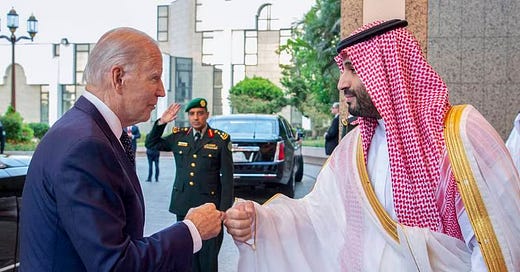Joe Biden's Worst Foreign Policy Idea
Biden's foolish pursuit of an "historic" deal with Saudi Arabia would trade away vital nuclear limits and reward two corrupt autocrats for minimal diplomatic gains.
Mohammad bin Salman lured Washington Post reporter Jamal Khashoggi to the Saudi consulate in Istanbul in October 2018. His hand-picked team of assassins lay in wait. They seized him, tortured him and killed him. They dismembered his body and smuggled the pieces out for disposal. Then lied about the murder for years.
While campaigning for the presidency, Joe Biden said he would make Saudi Arabia pay, he would make it a “pariah.” Now, he wants to pledge the lives of U.S. troops to defend the kingdom, vaulting it to the select group of nations that America is committed to defend. In the process, he would tear down vital barriers to the spread of nuclear weapons, reward Israeli Prime Minister Benjamin Netanyahu even as he plots relentlessly to dismember Israeli democracy, and drag the United States deeper into a region that is less and less vital to American national security.
Biden is pursuing a grand bargain. He is trying to broker a deal for Saudi Arabia to diplomatically recognized Israel. In exchange, Israel would make some vague promises to ease the life of Palestinians; the U.S. would commit to Saudi Arabia defense just as it commits to defend Japan and South Korea; and the U.S. would agree to Saudi demands that it be allowed to process uranium, allegedly for fuel for its planned nuclear reactors.
True, Saudi recognition of Israel would be historic. But how much would it really change the geopolitics of the region? Could we trust two leaders with long histories of corruption and dishonestly? There is nothing in either Netanyahu or bin Salman’s history that inspires trust.
Is it worth the cost? There are few issues in Washington that can unite experts on opposite sides of the fierce debate over nuclear diplomacy with Iran — but this is one of them. This week experts organized by the Foundation for the Defense of Democracy - a right-wing group advocating for war with Iran - issued a letter opposing the deal. It included many who had battled the FDD over the historic agreement negotiated by President Barak Obama that rolled back the Iranian program, including Amb. Robert Gallucci, and former State Department officials Susan Burke and Thomas Countryman. The group warned:
We urge you to reject the Kingdom of Saudi Arabia’s request for uranium enrichment as part of or separate from a normalization agreement between Saudi Arabia and Israel. Such an agreement could bring much needed stability to the region, building upon certain positive Saudi policies and encouraging further progress. However, Riyadh does not need uranium enrichment to produce peaceful nuclear energy. Enrichment could bring Saudi Arabia to the brink of acquiring nuclear arms, and U.S. policy should prohibit it.
Since the dawn of the atomic age, it has been a core U.S. national security priority to prevent the spread of uranium enrichment and plutonium reprocessing technologies, which could be used to make fuel for atomic weapons. America has pursued this policy even with potential nuclear cooperation partners that are close U.S. allies. Public reports indicate Riyadh has requested an enrichment facility operated by Americans inside Saudi Arabia, but this poses an unacceptable proliferation risk, particularly given Crown Prince Mohammed bin Salman’s public comments on nuclear weapons.
Indeed, even as bin Salman said this week that they are inching closer to a deal he reaffirmed that Saudi Arabia would seek a nuclear weapon if Iran builds one. U.S.-approved uranium enrichment plants would give him the means to do just that. He told Fox that “we are concerned of any country getting a nuclear weapon,” adding that if Iran did successfully develop a weapon “we will have to get one.”
Biden’s team seems motivated by two impulses: block China from advancing in the Middle East and secure an “historic” deal that would bolster Biden’s re-election prospects. They fear that if they don’t give into Saudi nuclear demands that the kingdom will turn to China for reactors and enrichment facilities. This could then extend to military cooperation with China, letting tens of billions of dollars in weapons sales slide from U.S. military contractors to Chinese ones.
Maybe. But there are plenty of ways to shore up relations and counter Chinese influence without the abandonment of nuclear safeguards and pledging American lives to defend a murderous regime. Former Pentagon official Bilal Saab, for example, argues that “A Saudi-Israeli normalization deal has a lot of merit and should be pursued for its own sake.” But, he says, “It should not be predicated on a U.S.-Saudi defense pact that…will obligate the United States to commit more military resources to the Middle East when it should be focused on preventing China from seizing Taiwan and on countering Russia in Ukraine.”
Mother Jones Washington Editor David Corn similarly asks if these diplomatic gains are worth “a security pact with a repressive and misogynistic regime that violates human rights and kills its critics?” (He and I discussed the deal earlier this week and he graciously quotes me in his new newsletter.)
I am an admirer of Biden’s foreign policy achievements, the way he and his top officials have restored American leadership in a new consensus approach to alliances and agreements.
But this deal is based on an outmoded view of U.S. interests. For all the grand talk, the core of U.S. interest in the Middle East has always been oil. It has been about protecting our access to this vital energy supply. But oil is less and less vital. The world is expected to hit peak oil demand later this decade and then begin a steady decline after 2026. With the exponential rise of electric vehicle (14 per cent of all new car sales last year), and solar and wind power, how much longer will we need Middle East oil?
I told Corn, “Why commit ourselves to expensive and dangerous new military alliances in a region that we are basically not going to care much about by the middle of this century?”
Finally, in his eagerness for a deal, Biden is hurting the efforts of Israelis to defend their democracy. He said little about Netanyahu’s attempted judicial coup in his meeting with the embattled prime minister at the United Nations this week (or the unprecedented thousands of protesters in New York and the tens of thousands demonstrating weekly in Israel). Instead, Biden promised him the White House meeting Bibi desperately sought. As the Israeli newspaper Haaretz said “Israel takes a backseat in Biden’s grand Saudi strategy.”
J Street President Jeremy Ben Ami issued this somber warning:
“While securing normalization of ties between Israel and Saudi Arabia is a worthy goal, any such agreement must meaningfully advance resolution of the Israeli-Palestinian conflict and the end of ongoing occupation — not sideline or ignore them. Diplomatic efforts should focus on advancing true peace, security and human rights in the region, and not on handing out unwarranted and regionally destabilizing gifts to PM Netanyahu or Mohammed Bin Salman,”
As Biden buckles, the principle hope to avert this disaster is that Saudi demands prove too much. That the machinations of regional autocrats prove too distasteful for the American public. That the importance of preserving democracy, defending human rights and preventing the spread of nuclear weapons overcome grand alliance dreams of White House officials.
This requires all who oppose this deal to raise their voices. The louder the warnings are about the pitfalls of this devil’s bargain, the greater the chances are that more reasonable actors in the Biden administration can pull the President back from the geopolitical brink.






